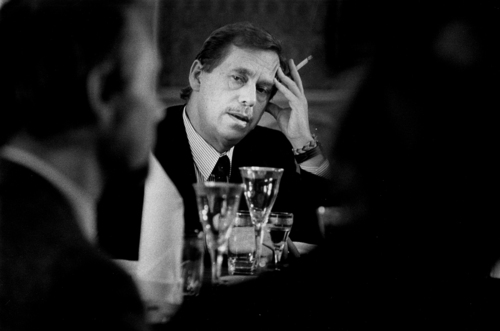Where are the great men? Are we beyond the point of elevating the individual over the group, or are there simply no more individuals? Marc Sageman, a former CIA officer, has warned for more than a decade of the emergence of “leaderless jihad” as terrorist movements spawn violent individuals. But lately his idea has been turned on its head, as the movement for freedom attempts to override the putsch for security. It seems there are no more barriers between the secure, the secured, and the guardians of their security; it is all the same anarchy, brutality, violence, and havoc. There is the elite and then there is everyone else. Enter Vaclav Havel.
The words of a Czech man were forwarded to me this afternoon, and they hit me like a cold sheet: “Yep, the last great man.” Every obituary printed today mentions Havel’s achievements: playwright and poet, artist, intellectual, and dissident — but these are titles. More important, he was an inmate who could only forsake the cell-block walls and bars later because he lived long enough to see the cafes and meet the Western intellectuals who idealized him, because he lived in a parallel time and knew moral courage as more than mere words.
In Sageman’s analysis, individuals are inspired by violence done in the name of a collective. In Havel’s world, the antithesis of Sageman’s, individual creative acts spawn a collective, which together can challenge and — inshallah and man willing — destroy an oppressive system. Havel did not create the guidelines of creative defense, nor did he spawn every activist who was tired of a system in which every last piece of bread must be saved because the proverbial rainy day is, in fact, every day.
Rather, Havel embodied the guidelines of creative defense with wit, wisdom, and the shortcomings of a man. He inspired people with a bold algorithm, a mantra really: living in truth. In an era of cryptic truths, so too was the very notion of “living in truth”. After 1989, he became the first anti-political president of the Czech Republic and the planet; he remains so to this day the bearer of a political legacy not so much shrouded in failure as indifference to power. Yet, he was never powerless, not for a moment.
Who in New York, Baku, or its affiliate, well-to-do cities of East and West dares brave the consequence for something greater than a slogan, or greater than themselves? To be a dissident has reached the point of cliché if only because human rights is all too often the case of a competing elites, alienated from “the people”; to be imprisoned does not necessarily mean you speak for human rights, but it does mean, if only for a moment, that you spoke for yourself. Yet in many societies, this remains a grave crime. To do so creatively, brilliantly, and in a way in which the humor never fades from the voice, the laughter never subsides, and the constant cackle is one that echoes in the executioner’s chamber as opposed to in society, the inmate’s cell and among those who have struggled to know the difference between the two — this is the gift Havel gave.
As a photographer, I seek out moments that reveal something apart from the constant and continuous flow of time. Whether in Baku or Istanbul or even New York, Washington, or Chicago, discussing the tumultuous events of this year, many people, even among the young, are reluctant to support anarchy over stability. But what is this stability? Few dare challenge stability, not with confrontation but rather with creativity, an act that in Havel’s time alone begged for confrontation. Havel was imprisoned for it. Like the smartest former inmates I know, he became a better man for it.
The overall message nowadays seems all too clear, echoing of earlier, broken times: come what may, it will come.
